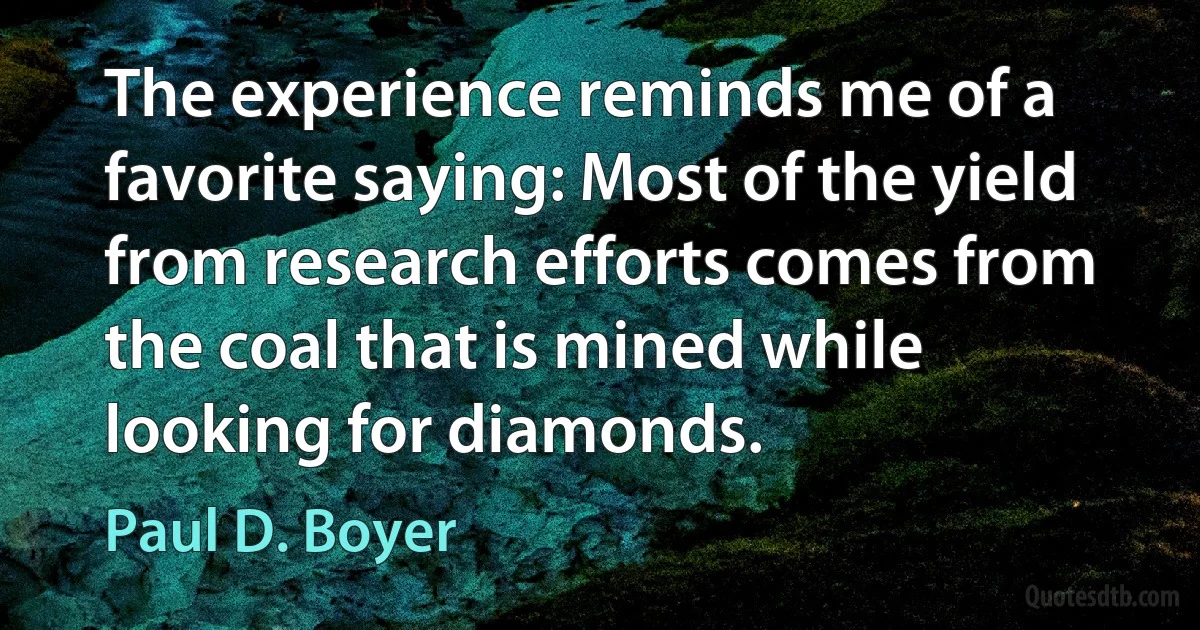Yield Quotes - page 4
There is nothing that a single massive sphere will or can ever do by itself that says it will both exert and yield attractively with a neighboring massive sphere and that it yields progressively: every time the distance between the two is halved, the attraction will be fourfolded. This unpredicted, only mutual behavior is synergy.

Buckminster Fuller
I render thanks and yield praise unto God for having been chosen by Him as the Exponent of His Cause in bygone days and in the days to come; there is none other God save Him, the Glorified, the All-Praised, the Ever-Abiding. Whatever is in the heavens and on the earth is His and through Him are we guided aright.

Báb
Vercingetorix, having convened a council the following day, declares, "That he had undertaken that war, not on account of his own exigencies, but on account of the general freedom; and since he must yield to fortune, he offered himself to them for either purpose, whether they should wish to atone to the Romans by his death, or surrender him alive." Ambassadors are sent to Caesar on this subject. He orders their arms to be surrendered, and their chieftains delivered up. He seated himself at the head of the lines in front of the camp, the Gallic chieftains are brought before him. They surrender Vercingetorix, and lay down their arms.

Julius Caesar
In bitter despair, some people have come to believe that wars are inevitable. With tragic fatalism, they insist that wars have always been, of necessity, and of necessity wars always will be. To such defeatism, men and women of good will must not and can not yield. The outlook for humanity is not so hopeless.

Harry S. Truman
Preservation, improvement, and civilization of the native inhabitants. The Hunter state can exist only in the vast uncultivated desert. It yields to the more dense compact form of and greater force of civilized population; and of right it ought to yield, for the earth was given to mankind to support the greatest number of which it is capable, and no tribe or people have a right to withhold from the wants of others more then is necessary for their own support and comfort.

James Monroe
We have entered a time of global transition marked by uniquely contradictory trends. Regional and continental associations of States are evolving ways to deepen cooperation and ease some of the contentious characteristics of sovereign and nationalistic rivalries. National boundaries are blurred by advanced communications and global commerce, and by the decisions of States to yield some sovereign prerogatives to larger, common political associations. At the same time, however, fierce new assertions of nationalism and sovereignty spring up, and the cohesion of States is threatened by brutal ethnic, religious, social, cultural or linguistic strife. Social peace is challenged on the one hand by new assertions of discrimination and exclusion and, on the other, by acts of terrorism seeking to undermine evolution and change through democratic means.

Boutros Boutros-Ghali
Thought depends on the habitual exercise of the speculative faculties; action, on the determination of the will. The one assigns reasons for things, the other puts causes into act. ... Such is the effeminacy of the speculative and philosophical temperament, compared with the promptness and vigour of the practical! ... Reasoners in general are undecided, wavering, and sceptical, or yield at last to the weakest motive as most congenial to their feeble habit of soul.

William Hazlitt
I do not believe that we can make progress in European appeasement if we allow the impression to gain currency abroad that we yield to constant pressure. I am certain in my own mind that progress depends above all on the temper of the nation, and that temper must find expression in a firm spirit. This spirit I am confident is there. Not to give voice it is I believe fair neither to this country nor to the world.

Anthony Eden
Yesterday I had a violent run-in with M. Eugene Manet on the subject of Seurat and Paul Signac. The latter was present, as was Guillaumin. You may be sure I rated Manet roundly. - Which will not please Renoir. - But anyhow, this is the point, I explained to M. Manet, who probably didn't understand anything I said, that Seurat has something new to contribute which these gentlemen, despite their talent, are unable to appreciate, that I am personally convinced of the progressive character of his art and certain that in time it will yield extraordinary results. Besides I am not concerned with the appreciation of artists, no matter whom. I do not accept the snobbish judgments of "romantic impressionists" to whose interest it is to combat new tendencies. I accept the challenge, that's all..

Camille Pissarro
The Machine Age's commitment to cause and effect was the source of many dilemmas, including the one involving free will. At the turn of the century the American philosopher E. A. Singer, Jr., showed that science had, in effect, been cheating. It was using two different relationships but calling both cause and effect. He pointed out, for example, that acorns do not cause oaks because they are not sufficient, even though they are necessary, for oaks. An acorn thrown into the ocean, or planted in the desert or an Arctic ice cap does not yield an oak. To call the relationship between an acorn and an oak ‘probabilistic' or ‘non deterministic causality,' as many scientists did, was cheating because it is not possible to have a probability other than 1.0 associated with a cause; a cause completely determines its effect. Therefore, Singer chose to call this relationship ‘producer-product' and to differentiate it from cause-effect.

Russell L. Ackoff
Ah! And in writing down these stories of mine, arranging these tales of my father in the used up margin of its text, do I not yield to the secret hope that, someday, they will strike root imperceptibly between the faded leaves of that most magnificent, scattering book; that they will fall into the great rustle of its pages, which will enfold them?

Bruno Schulz



